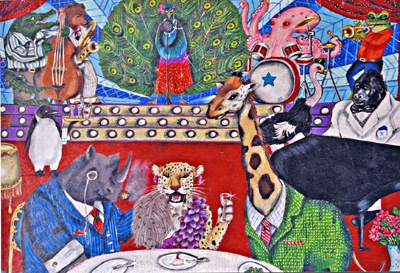All Nonfiction
- Bullying
- Books
- Academic
- Author Interviews
- Celebrity interviews
- College Articles
- College Essays
- Educator of the Year
- Heroes
- Interviews
- Memoir
- Personal Experience
- Sports
- Travel & Culture
All Opinions
- Bullying
- Current Events / Politics
- Discrimination
- Drugs / Alcohol / Smoking
- Entertainment / Celebrities
- Environment
- Love / Relationships
- Movies / Music / TV
- Pop Culture / Trends
- School / College
- Social Issues / Civics
- Spirituality / Religion
- Sports / Hobbies
All Hot Topics
- Bullying
- Community Service
- Environment
- Health
- Letters to the Editor
- Pride & Prejudice
- What Matters
- Back
Summer Guide
- Program Links
- Program Reviews
- Back
College Guide
- College Links
- College Reviews
- College Essays
- College Articles
- Back
Retirement Isn't Only for Humans
Imagine being in an enclosed space for a majority or all of your life. You become dependent on the people in control of you and you’re never able to go outside of the borders set for you. You don’t have enough space to live, but for some reason you are crammed into this tight space. For the last 33 years this has been happening to a performance Orca named Tilikum. This whale has been getting a lot of attention because he was involved in three whale trainer deaths throughout his performance career, and people want to look more into why he is having this behavior. The main belief is that these behaviors have happened because he has been captive for a majority of his life and he’s becoming frustrated with being held captive.
A lot of times, people forget that animals can feel emotions and feel pain. This in turns results in being taken from their natural environment and put into a new one for the benefit of a human. When animals are kept in captivity, they are deprived from “the ability to freely engage in instinctual behaviors in their natural environment” (bornfreeusa). When animals are forced into enclosed spaces, they start to mentally deteriorate which in turn results in the animals acting in their natural state and potentially gets someone hurt. Once companies begin to realize that releasing these animals into sanctuaries that are big enough to accommodate them is something that should be taken into consideration, then the amount of deaths and injuries from captivated animals wouldn’t be as big because the animals are where they belong. I believe this is the reason why we should in fact keep animals in their natural habitat. If people want to see these animals then they should go to those animals in their natural habitat, instead of putting these animals into captivity just for the benefit of people.
Us humans are more similar to other animals than we think. “They feel pain, suffer and experience stress, affection,excitement and even love”. If they animals are so similar to us, why do we treat them as if they are below us? Being in captivity is like being in a cement prison for your entire life. We can’t get upset when these animals get agitated and lash out, when we are forcing them into captivity and making them do performance shows day in a day out. Although sanctuaries have it’s pros and cons, I think it would benefit the cetaceans because they would “live in an environment that maximizes well-being and autonomy and is as close as possible to their natural habitat.”
Although big theme parks such as Sea World have cetacean shows that gets them a lot of power and money, it is important to realize that companies will only do what customers allow. The reason that Seaworld and other major theme parks have continued for many years doing Orca shows is because people have continued to pay money to go and watch the shows. In order for us Americans to stop Orca shows and especially help Tilikum and many other animals go into retirement, we have to stop supporting these companies that continue to ignore people telling them that should stop. If Seaworld has no money, they would have no choice but to stop doing shows and potentially even shut down. So if there is any change that wants to be seen, it needs to be from the consumer because the consumers essentially dictates whether or not a companies is or isn’t successful. That can be anything from performance shows, t-shirts, keychains, stuffed animals, and anything else that remotely supports something that you believe that needs to be changed.

Similar Articles
JOIN THE DISCUSSION
This article has 0 comments.

I wrote this article after watching "Blackfish". This is a response to what I think should happen to Tilikum which is a performance Orca. After reading this I hope people begin to realize that captivity isn't a good idea for animals.